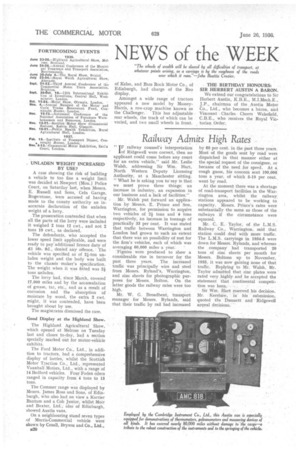Railway Admits High Rates
Page 62

If you've noticed an error in this article please click here to report it so we can fix it.
41
IF railway counsel's interpretation of Ridgewell were correct, then no applicant could come before any court for an extra vehicle," said Mr. Leslie Walsh, addressing Sir Wm, Hart, North Western Deputy Licensing Authority, at a Manchester sitting. " What he is asking you to' say is that we must prove three things: an increase in industry, an expansion in our business and a lack of facilities."
Mr. Walsh put forward an application by Messrs. E. Prince and Son, Warrington, for permission to acquire two vehicles of 21 tons and 4. tons respectively, an increase in tonnage of practically 33 per cent. It was stated that traffic between Warrington and London had grown to such an extent that there was no possibility of rest for the firm's vehicles, each of which was
averaging 60,000 milesa year.
Figures were produced to show a considerable rise in turnover for the past three years. .The increased traffic was principally wire and steel from Messrs. Ryland's, Warrington, and zinc sheets for photographic purposes for Messrs. Bolton. On the latter goods the railway rates were too high.
Mr. W. G. Broadbent, transport manager for Messrs. Rylands, said that their traffic by rail had increased
by 60 per cent, in the past three years. Most of the goods sent by road were dispatched in that manner either at the special request of the consignee, or because of the need for speed. At a. rough guess, his concern sent 100,000. tons a year, of which 5-10 per cent, went by road.
At the moment there was a shortage of road-transport facilities in the Warrington area, whilst the railway stations appeared to be working to capacity. Messrs. Prince's rates were substantially the same as those of the railways if the circumstance were equated.
Mr. C. E. Taylor, of the L.M.S. Railway Co., Warrington, said that station could deal with more traffic. The L.M.S. carryings in 1934-5 were down for Messrs. Rylands, and whereas the company had transported 20 tons of zinc sheets per month for Messrs. Boltons up to November, 1935, it was now gaining none of that traffic. Replying to Mr. Walsh,. Mr. Taylor admitted that zinc plates were rated very highly and he accepted the statement that continental competi
tion was keen.
Sir Wm. Hart reserved his decision. Mr. Kershaw, in' his submission. quoted the Dunnett and -Ridgewell appeal decisions.












































































































































